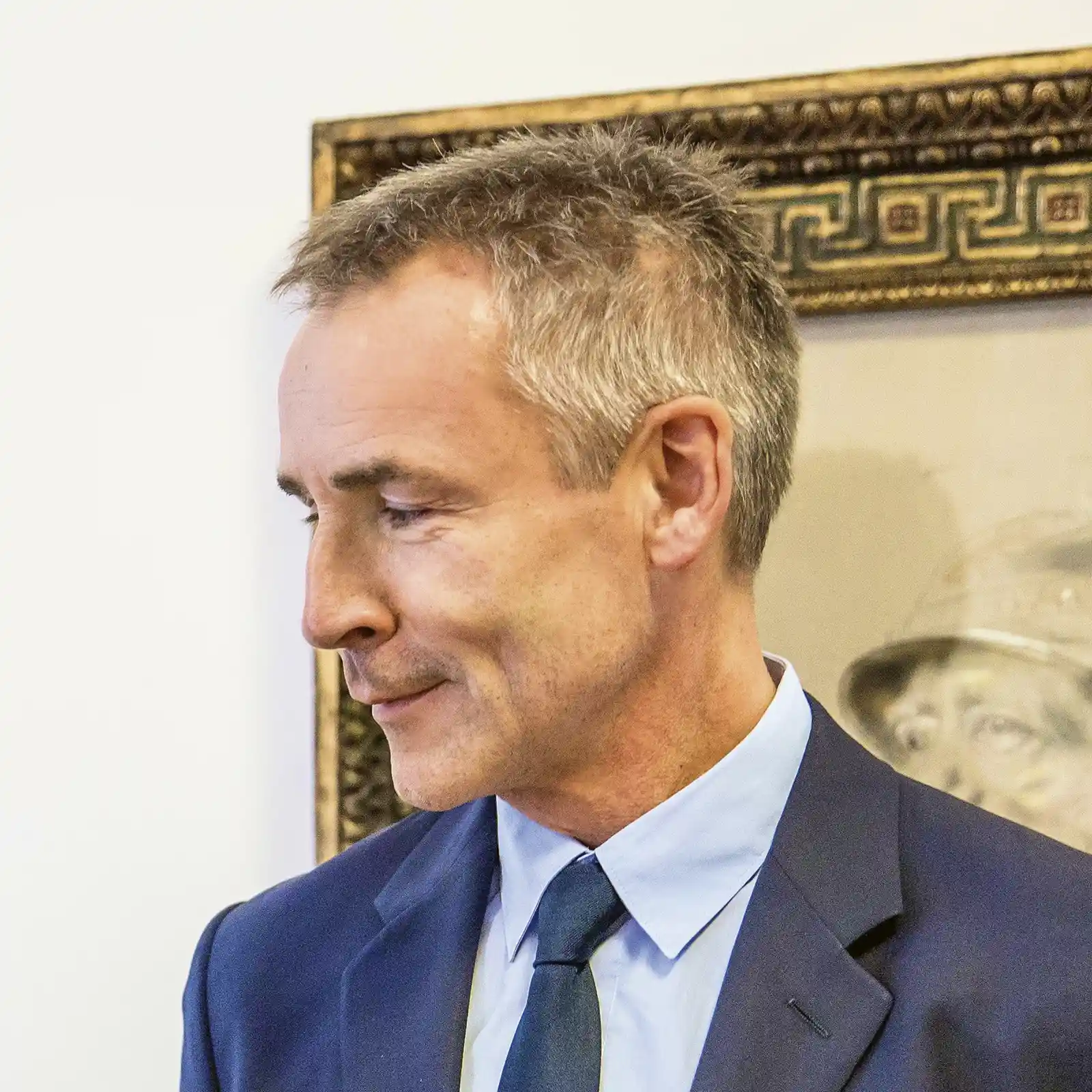
Mr Michaelsen, what was your most uncanny experience during an interview?
In 1990, I interviewed the writer Friedrich Dürrenmatt for six hours in his house in Neuchâtel. During the final hour, he mused on the necessity of death and said, 'If we were immortal, there would only be a mush of single-celled organisms on the Earth’s surface. As I am 30 kilos overweight, I do not envy my pallbearers. Perhaps I should remember these gentlemen in my will.' A week later, the radio announced Dürrenmatt’s death.
« The cardinal mistake is to give too many interviews. »
Your job is to ask questions. Do stars also want to know anything about you?
No, I’m just the trampoline they need to get them bouncing up in the air. After a five-hour interview, the great critic Marcel Reich-Ranicki said to me, 'We’ve been talking exclusively about me for so long, now I’d like to know something about you. Tell me, what did you think of my last book?' But there’s no need to be offended by this kind of behaviour, because self-starvation and total egocentrism are the basis of every artist’s existence. Anyone who does not believe that world revolves around him or her, will not get very far. No greatness without delusions of grandeur.
What does success do to people?
Success radicalises a person’s character. It makes smart people smarter and stupid people stupider. The penalty of success is self-doubt. The greater your talent, the more mercilessly you doubt yourself. Success only really makes you happy when you see others fail – preferably a good friend. But the stars will only tell you that after the second bottle of wine.
How can you tell if someone is lying in an interview?
The interviewees first put on their favourite mask and tell you what they want to read about themselves: flattering heroic legends or touching stories about their rise, fall and rebirth. One rule of thumb is: the more distinct and attractive a story sounds, the less you should believe it. It should come as no surprise that celebrities often don’t tell the truth, because none of us can stand ourselves without a little retouching. There are, however, calculated pathological liars in whom this can be annoying. I often sit opposite stars who tell their lives in ever new versions that are mutually exclusive. What they pass off as their lives is in fact pure fiction. One can only console oneself with the thought that every masquerade is also an unmasking.
What do the stars do wrong in interviews?
The cardinal mistake is to give too many interviews. The taboo of privacy is the first step towards becoming a legend. Greta Garbo gave no more than 14 interviews in her lifetime. Being mysterious keeps the audience’s curiosity alive.
How can you tell when an interview is going well?
When people move from simply answering to lively storytelling. It’s about significance. You are on the lookout for characteristic details that reveal the structure and essence of someone’s life.
You also address intimate topics such as sex and infidelity. Why this indiscretion?
Entertainment is the Trojan horse with which you can plant truth and knowledge in people’s heads. That’s why you have to make the difficult things easy and the easy things difficult. It’s child’s play to listen to Nobel Prize laureate Peter Handke talk for hours about ancient Greek poets. But it is much more lucrative to have him answer the question of why he slept almost exclusively with actresses for around 50 years.
When do you suffer during interviews?
When I’m met with a barrage of detailed stupidity and I feel as if I’m smarter than the interviewee. No-one can squeeze water out of a stone or turn dust into glitter. If there are people sitting in front of your microphone whose popularity is greater than their talent, you can only lose.
« If you are constantly in the limelight, you become blind. »
These days, interviews usually have to be authorised in writing by the interviewees. What is your experience here?
You sometimes get to know people better during the authorisation process than during the interview. You can tell exactly where their vanities and painful spots lie by the changes or deletions. I once asked Peter Handke about his partner at the time, Katja Flint, a German actress. His answer was, 'Why don’t you go and fuck yourself?' He authorised this for publication. In contrast, the former German national goalkeeper Oliver Kahn, who likes to be celebrated as 'Titan' or 'King Kahn', is a lamentable figure. He really spilled the beans during the interview, but refused to authorise it for publication.
Do you sometimes feel sorry for the stars?
Yes, because fame is a mask you wear until it wears you. being a celebrity requires a huge amount of energy because you’re forced to pretend to be happy all the time. A star who complains or talks about his or her misfortune would immediately be sent to kingdom come by his fans for ingratitude.
Does fame deform a person?
Yes. If you are constantly in the limelight, you become blind. You can either see or be seen. A star is listened to around the clock. This makes him deaf to his own mistakes & errors and ruins his ability to listen.
Have you ever interviewed stars when they are on drugs?
That happens. I once interviewed the pop singer Seal when he was still a global star. I had prepared around sixty questions, but I was only able to ask one, because Seal went into a 90-minute long rant that only hardcore pot-smokers do. When he had finished his monologue, a robust lady with a clipboard appeared and said that my interview time had unfortunately expired.
Were you ever a victim of a star’s airs and graces?
Yes, but at some point you realise that behind boorishness there is usually self-hatred and that arrogance is the protective attitude of the injured. A star who turns up late for an interview usually has no airs and graces, but a fear of failure.
Do you have a motto?
No, but I go through life with the admonition of a friend, 'At my mother’s grave, I only regretted one thing: not having presented her with a work of art made of questions while she was still alive.' You can also recognise that you no longer love someone by the fact that you no longer have any questions for them.
What criteria do you use to select your interview partners?
Love, admiration, respect for great achievements. I like people who hope that there is a country beyond the rainbow. That’s why I like this quote by Jean Cocteau, 'If my house were on fire, what would I save? First the fire.' If I didn’t respect the artist or their work, I couldn’t get out of bed in the morning. Sooner or later, everyone ends up at the level they settle for. Those who sit opposite the wrong people spend their lives in a marinade of irony and sarcasm. Who wants that?
Who particularly impressed you?
Old people like Dürrenmatt, the theatre director George Tabori or the publisher Inge Feltrinelli. People over 70 are dangerously truthful because they don’t care about their future at all. Their struggles to move up the ladder are behind them and there are few living people they need to make allowances for. For interviewers, old people are paradise. The clever ones among them transform loneliness into insight.
« One key to success is solitude. »
Do stars have the right to refuse questions?
Of course. Hollywood actor Bruce Willis once stunned an interviewer with the remark, 'Stick your questions where the sun never shines!’ The composer John Cage formulated his refusal more elegantly, ‘That’s a very interesting question. I don’t want to spoil it with an answer.'
Who would you go out for a beer with in private?
Most likely with the philosopher Peter Sloterdijk, because this man is constantly coming up with funny sentences like, 'If neoliberalism had tits made of cement, it would look like Heidi Klum.'
Does fame eventually turn you crazy?
Narcissistic disorder is not the result of fame, but its cause. It’s not the general acclamation that makes people crazy, it’s the craziness that leads to acclamation. Casting shows and jungle camp TV programmes are proof of this. One key to success is solitude. If you need an audience to survive, you’re already on the right track. You will find the craving for confirmation and the blissful drunkenness when receiving applause in every star.
What insight from an interviewee accompanies you through life?
It comes from Hollywood veteran Steven Spielberg, 'Every clusterfuck begins with a mindfuck.' Which basically means: every huge mess starts with an overestimation of one’s own abilities.
You have been conducting interviews for 40 years. What is your motivation?
I am interested in what drives a person, what defeats them, what makes them grow or what destroys them; their greatness; and their despair.
Sven Michaelsen studied literature and history. His trademark is portrait conversations with the leading figures and idols of our time. In 2014 and 2018 he was awarded the Deutscher Reporterpreis (German Reporter Award).








